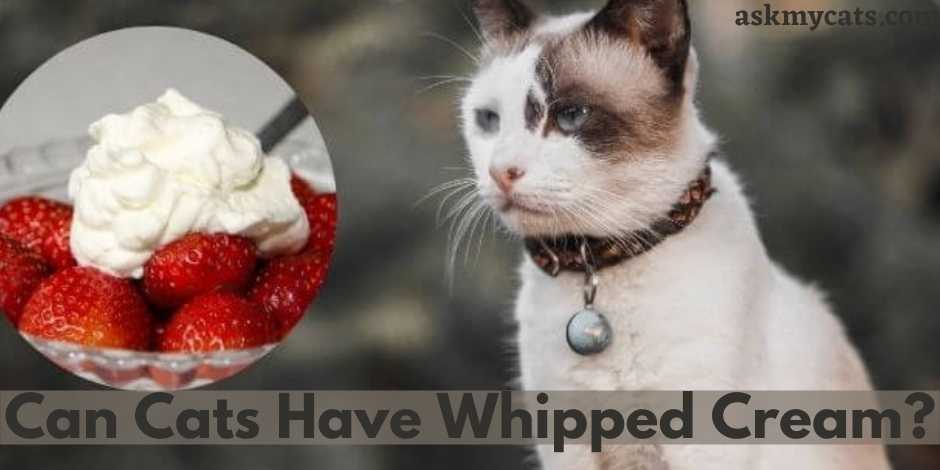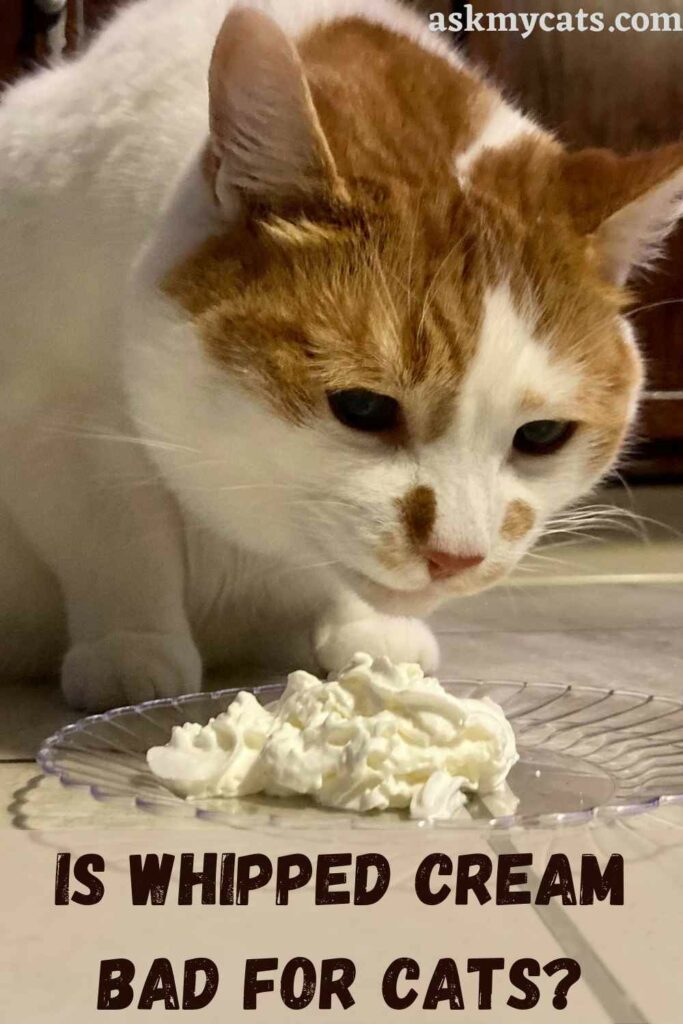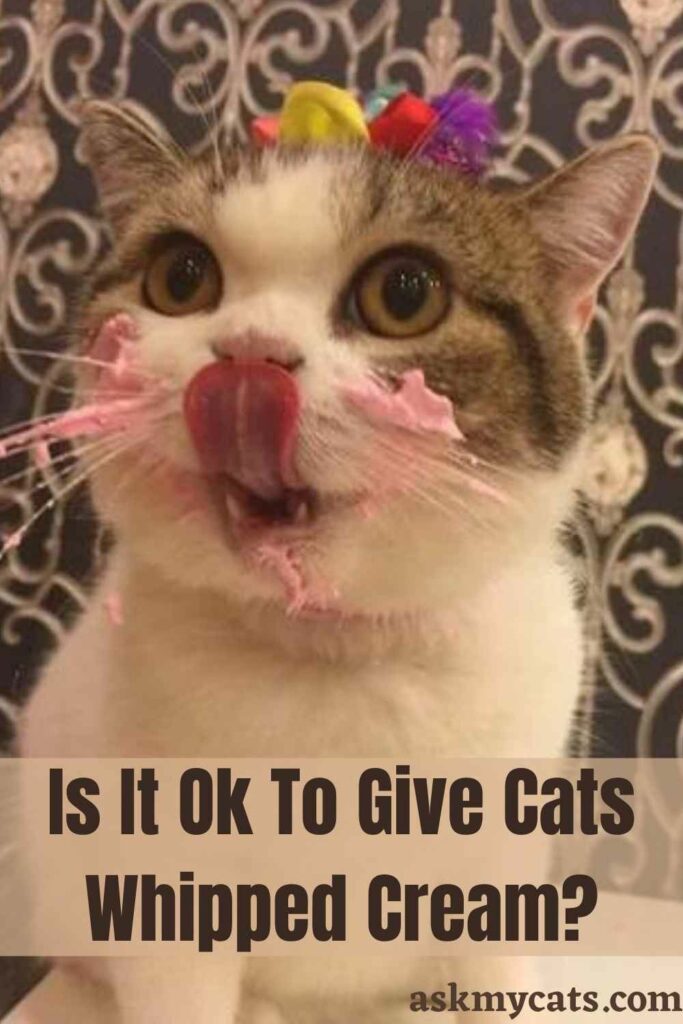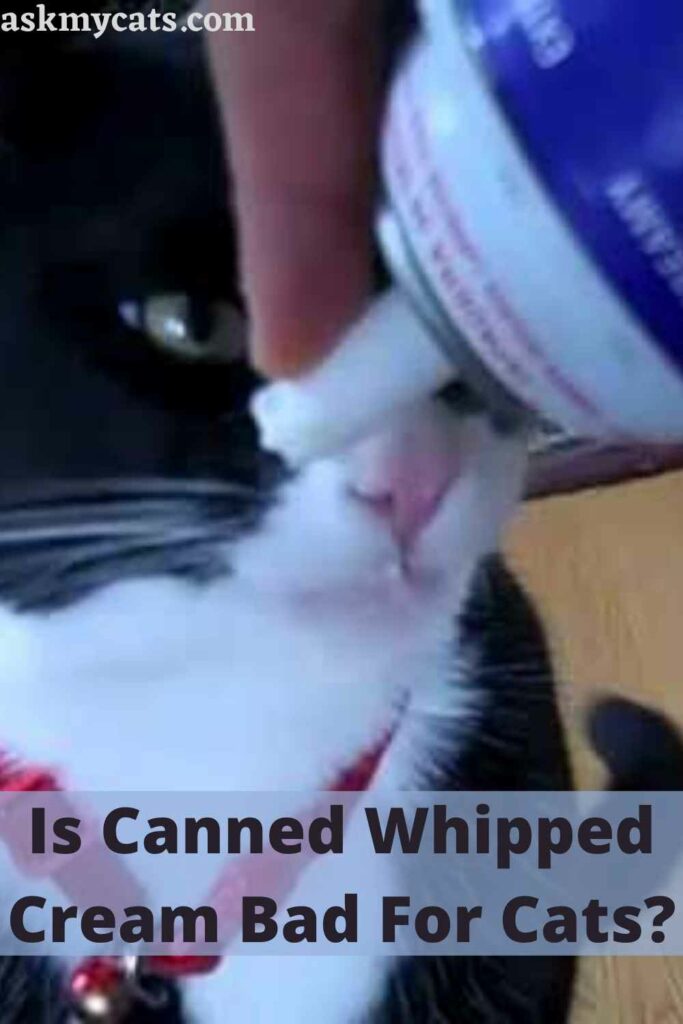Whipped cream is a popular topping for lattes, hot chocolates, pies, and, of course, ice cream. There are numerous things that are okay for your cat to eat, but many people ask if they may eat dairy items, particularly whipped cream, because it is such a quick treat.
So, can cats have whipped cream?
No, in general cats can’t have whipped cream. Healthy cats may tolerate little amounts of whipped cream on rare occasions. Whipped cream, on the other hand, includes chemicals that are harmful to cats. As a result, it is preferable to seek a healthier alternative snack.
This article will talk about the effects of whipped cream on your cat and how can you contain them.


Give Your Cat the Perfect Day
Get the Free Ebook!
Can Cats Have Whipped Cream?
Yes, technically cats can eat whipped cream but that doesn’t mean it should. Whipped cream does more harm than good to cats.
Whipped cream is often harmful to cats. Healthy cats may tolerate little amounts of whipped cream on rare occasions.
Whipped cream, on the other hand, includes chemicals that are harmful to cats. As a result, it is preferable to seek a healthier alternative snack.
Cats’ bodies, unlike humans, cannot handle dairy products, sugar, or other similar substances. Whipped cream is largely made up of chemicals that are harmful to cats.
While humans can appreciate sweet foods such as whipped cream, cats do not have the receptors to do so. In fact, whipped cream is likely to create health problems in cats, therefore owners should avoid offering it to their pets.
Is Whipped Cream Bad For Cats?
Yes, whipped cream is bad for cats due to these reasons: –

To begin with, most cats are lactose intolerant, which is comparable to an allergy. Because the digestive system cannot metabolize dairy, lactose intolerance can produce a variety of problems, including upset stomachs and diarrhea.
Cats will experience pain and discomfort if they consume dairy. Lactose intolerance affects humans and cats in the same way, so finding alternatives and avoiding dairy is best.
Lactose is a sugar that can be found in a variety of dairy products, including cheese, milk, and whipped cream. Lactose intolerance refers to a cat’s inability to digest the sugar lactose in the same way that non-lactose intolerant people can.
It’s important to remember that not all cats are lactose intolerant. However, because the vast majority of cats are lactose intolerant, it is best to be cautious.
If cats ingest dairy, it may remain undigested in their stomachs, causing fermentation and gas production. The cat will have excessive flatulence and stomach discomfort as a result of the excess gas.
Lactose is an undigested sugar that causes water to enter the cat’s intestines, which can cause diarrhea.
Even if your cat isn’t lactose intolerant, there are additional elements in whipped cream that might harm a cat’s health. The cream is much higher in fat than conventional milk, which is bad for a cat’s health. As a result, whipped cream would have little nutritional value to cats.
Sugar is also present in whipped cream, which is toxic to cats. Sugar is not a natural part of a cat’s diet, thus it will have a negative impact on their body.
Sugar, like lactose, produces problems such as nausea and vomiting. Sugar can also cause tooth problems and diabetes in cats.
Corn syrup is found in most whipped cream brands, and corn syrup acts similarly to sugar in cats. Corn syrup can cause their blood sugar to fluctuate, which is very dangerous for diabetic cats.
Artificial sweeteners, such as xylitol, may be found in other brands of whipped cream, but they can induce blood sugar fluctuations in cats.
Whipped cream is extremely high in calories, so even a small amount can cause your cat to overeat. Whipped cream has roughly 51 calories per spoonful.
The average cat requires roughly 20 calories per pound of body weight, so a cat weighing 10 pounds would require 120 calories per day.
You might also like to read about can cats eat sugar
Giving them simply one tablespoon of whipped cream would provide them with over half of their daily caloric intake while providing them with no nutritional value.
Whipped cream is high in calories and sugar, which can be detrimental to cats, especially if they are overweight or have diabetes. Obesity can drastically reduce a cat’s lifetime and cause other health problems.
Obesity in cats is largely avoided, but many cats become obese as a result of overfeeding specific foods (such as dairy), and other factors.
Whipped cream also contains carrageenan, which helps foods like whipped cream keep their texture. Carrageenan is a carcinogen that can cause cancer in large doses, which is why it is not found in pet feeds.
Carrageenan, on the other hand, is likely to be present in most whipped creams, therefore pet owners should avoid giving it to their cats.
Nitrous oxide is included in most manufactured whipped creams, especially canned varieties. Laughing gas, or nitrous oxide, is a typical anesthetic used in settings like dentist clinics.
Nitrous oxide aids in the removal of whipped cream from the can. It can make humans dizzy, and because cats have smaller bodies, the effects will likely be worse.
It’s worth noting that whipped cream can make cats feel bloated. A cat will not feel the need to consume its regular nutritional food if it is satisfied.
Cats will develop shortages if they do not get enough vital nutrients from their typical diets. As a result, it’s advisable to forgo the whipped cream and let cats stick to their regular diets.
You might also like to check out can cats have chocolate ice cream
Why Do Cats Like Whipped Cream?
Whether a cat will like whipped cream or not, totally depends on its personality as whipped cream has no certain ingredient that attracts cats.
Whipped cream is neither on the list of popular food that cats despise nor on the list of foods that cats prefer.
Eating whipped cream when your cat is around, will reveal this. Try to check whether your cat is purring and walking about when you are eating it. If yes, then your cat likes whipped cream.
Is It Ok To Give Cats Whipped Cream Occasionally?
No, it is not ok to give cats whipped cream as it does more harm than good to their health.

Whipped cream is created with sugar and vanilla extract in addition to dairy.
Each of these substances has the potential to cause digestive issues in your cat, despite the fact that none of them are poisonous to cats.
Whipped cream contains more than just dairy products that can harm a healthy cat.
You should also be cautious if your cat consumes sugar or vanilla extract.
Sugar is not poisonous to cats, but it is unnecessary in their diet.
They can damage their pancreas and raise their risk of diabetes and obesity if they eat too much or too regularly.
Sugars are readily stored as fats in their bodies, and they are not expelled as they should be.
Although vanilla is not toxic to cats, vanilla extract contains around 34% ethyl alcohol. For cats, too much of this can be toxic.
So it is best to avoid feeding your cat whipped cream, as there are plenty of tasty are healthy alternatives easily available.
Also, check out can cats have ice cream
What Happens If Cats Eat Whipped Cream?
If a cat happens to eat whipped cream in a small amount it will result in more gas than usual for several hours, but beyond that, they will probably be okay.
Cats are cunning animals. Don’t be alarmed if your cat sneaks up on the counter for a stealthy sip or two of whipped cream. For many hours, your cat will most likely have more gas than usual, but after that, they should be OK.
If you know your cat has severe lactose sensitivity, be prepared for some vomiting or diarrhea when it arrives in their tummies.
Even if your cat does not appear to be lactose intolerant, feeding them whipped cream is a bad idea. It contains sugar and vanilla, which will upset their tummies and may result in long-term disease.
How Much Whipped Cream A Cat Can Eat?
You can offer your cat a quarter teaspoon (ideally less) of whipped cream on very rare occasions. Whipped cream should not be given to cats on a daily basis.
Giving them that much every other month is not a bad option. It’s better if you can discover a healthier treat for your cats.
Certain cats may not have a negative reaction to a modest amount of whipped cream every now and then.
However, this does not imply that cat owners should give their cats whipped cream on a daily basis.
Whipped cream consumption on a regular basis can have significant health consequences for cats that are readily preventable.
Also, check out Can Cats Eat Vanilla? Is Vanilla Safe For Cats?
Is Canned Whipped Cream Bad For Cats?
Yes, canned whipped cream is bad for cats.

Nitrous oxide is included in most manufactured whipped creams, especially canned varieties.
Laughing gas, or nitrous oxide, is a typical anesthetic used in settings like dentist clinics.
Nitrous oxide aids in the removal of whipped cream from the can.
It can make humans dizzy, and because cats have smaller bodies, the effects will likely be worse.
Vanilla essence is found in most canned whipped cream, which cats should avoid.
The vanilla extract includes alcohol, which is harmless to humans but dangerous to cats.
If cats consume too much alcohol, they may develop liver problems. Cats can also become ethanol poisoned if they consume alcohol-containing goods.
Ethanol is readily absorbed by a cat’s gastrointestinal tract, resulting in lethargy, vomiting, dehydration, hypothermia, and other symptoms.
Can Cats Eat Cool Whip?
Yes, cats can eat cool whip but it is recommended to avoid feeding it to them.
Cool Whip is full of chemicals and trash, including hydrogenated oils and a lot of sugar, so you shouldn’t give it to your cats on a daily basis.
It also contains dairy, which might irritate the stomach of many cats. Cool Whip (or any other whipped topping) does not, however, pose a health risk to cats.
Can Cats Have A Puppuccino?
Yes, cats can have a puppuccino but only as a treat on occasions.
You must have seen those cute vids of people pulling up to a Starbucks and getting little puppy whips?
If you haven’t tried them yet, they’re just small whipped cream cups. The name pupuccino comes from the fact that it was created primarily for dogs.
Is it possible for your cat to have this as well? Yes, of course! Because cats are still mostly carnivores, I wouldn’t make this a frequent treat.
Treat this as a special treat, similar to how you would treat your favorite delicacies. A piece of cake every now and then isn’t harmful. But, it must be fed only as a treat only on rare occasions.
Frequently Asked Questions
Can Cats Have Whipped Cream From Starbucks?
No, cats shouldn’t have whipped cream from Starbucks as Adult cats are known to have lactose intolerance, and the dairy in the whipped cream may not be good for them. There are also a lot of calories in whipped cream.
Are there benefits to feeding a cat whipped cream?
Eating whipped cream does not provide any benefits to cats. Whipped cream provides negligible nutritional value to cats, especially when compared to their typical diets. Cats can’t taste sugar, so the “sweet” taste of whipped cream won’t appeal to them. As a result, your cats are unlikely to enjoy sweet foods like whipped cream in the first place.
Final Words
If your cat only ingested a small amount of whipped cream, they will most likely be alright. Giving your cat whipped cream on a regular basis, however, should not become a habit.
Many individuals offer whipped cream to their cats without realizing the minor adverse effects, such as flatulence. Whipped cream may also have extra sugars and sweeteners, which may be detrimental to your cat.
Whipped cream isn’t a great treat for cats because it’s unhealthy for them. Lactose, which cats can’t digest, sugar, which causes weight gain, and other potentially dangerous components are all included in whipped cream.
Finding an alternate, a healthful treat for cats might be preferable.
If you have any unanswered questions, feel free to ask us in the comments section.
